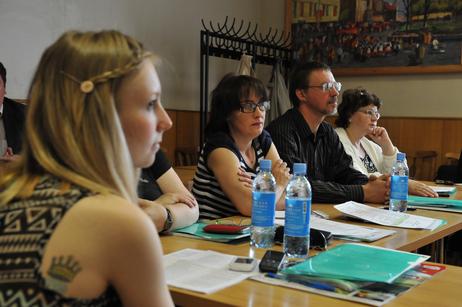As a whole, the community college system is a major training ground for the nation's workforce and serves as a career-development incubator for today's jobs and future industries. The Green California Community College Summit, taking place October 8 – 9, 2008 at the Pasadena Convention Center in Pasadena, California, will address the issues of building green campuses, creating a green curriculum based on technology that is being developed at lightning speed to meet the needs of tomorrow’s green economy.
We are participating in the Summit to share our experience and learn from other community college districts and experts in the fields of green building, curriculum, and technology. As we march into a more sustainable and technology-based culture, the community college system needs to continue to develop innovative teaching methods, academic programs, courses, and content that address the needs of 21st-century students - especially as it relates to green technology. Alternative energy solutions and renewable technology are in high demand and the need for green innovation is having a tremendous impact on how community colleges formulate policies, initiatives, and programs to stay ahead of the curve.
This TEDTalk discusses sustainable schools.
A significant number of all U.S. undergraduates pass-through community colleges seeking training and education in a variety of fields. With emerging green technology and the industries that support it rising steadily, training workers who understand these new standards and are skilled in applying them will be the best service we can give to students. These will be the same students who will make up a new talent pool of environmentally-conscious, highly-skilled workers.
As a model, the Los Angeles Community College District (LACCD) is implementing a Green College Initiative & Curriculum program that includes the development of green buildings, as well as a curriculum that covers a wide variety of disciplines such as architecture, solar installation, alternative fuels, water supply, wastewater, and sustainable construction. Our building program is a massive green effort that will result in the development of 44 new Leadership in Energy and Environmental Design (LEED) buildings, and two new satellite campuses are also slated to be LEED-certified. Our sustainability policy has led to the development of a Renewable Energy Plan that includes generating enough on-site, renewable power through solar, wind, geothermal, and energy storage using techniques such as hydrogen-generation and storage at each campus to, ultimately, make all nine colleges energy independent.
This video explains what green technology is.
On many levels, the benefits of implementing a green initiative and green building are extensive. For starters, a strong education program prepares students for future employment, and national forecasts indicate that many of the country's future top growth occupations will be eco-centered. Colleges designed with proper ventilation, material selection, acoustical quality, and material selection have been shown repeatedly to improve student and employee health, promote higher attendance, and result in better student performance. Attention to site planning and adequate daylighting has been shown to heighten student performance by as much as 25 percent.
Decreased operating costs are another measurable benefit of "going green". Energy and water operating costs can be reduced by 20 to 40 percent, allowing community colleges to provide a unique educational opportunity when advanced technology and design are made visible with buildings seen as teaching tools. Green building design and informational kiosks can also be used as important features of the college experience and can contribute to the effort to combat climate change.
Advancements in training and educational programs will better address our changing environment and workforce. Growing industries and new technology will impact us in the future and anticipating the skills necessary for our students to work in those industries helps us all to succeed. This means that community colleges must lead the country in providing sustainable education that boosts enterprise and produces good stewards to conserve our most vital natural resources.
At the end of the day, green technology will continue to influence and impact our lives, meaning that the need for us to create a new pipeline of eco-conscious, highly-skilled workers and students is ever-present. Our policies, programs, and initiatives must be innovative and creative if we are going to make a difference. Continued preparation for the advances in green technology will be even more critical than ever before. For the community college system, how effectively we train and educate our nation for the new green economy will likely shape our survival. Beginning our green efforts now gives us a great head-start toward developing an eco-friendly, highly-skilled workforce.
Questions? Contact us on Facebook. @communitycollegereview












